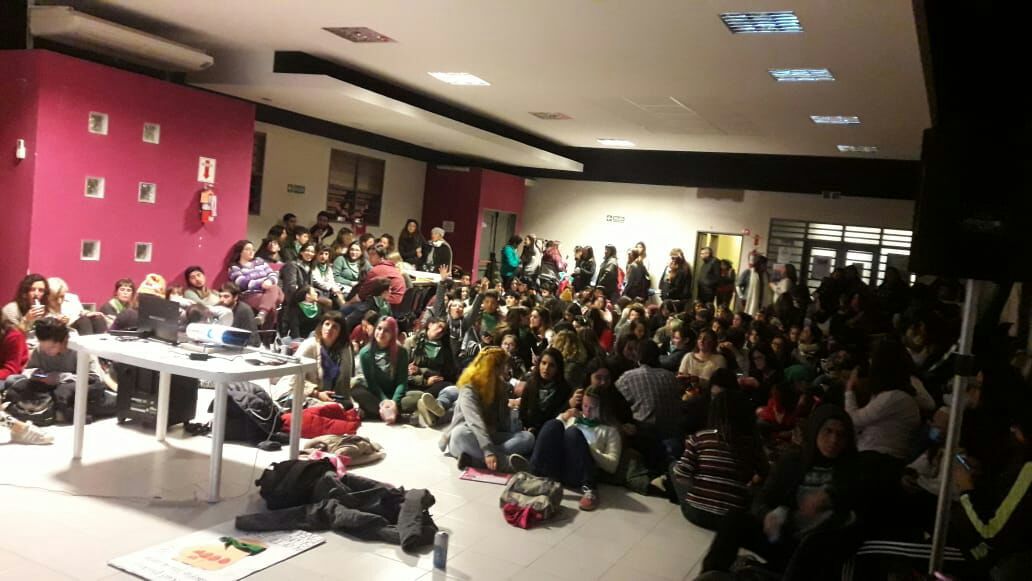The parliamentary debate in the Chamber of Deputies of the Nation came to an end during the morning of Thursday, after a marathon session, and resulted in the expected average sanction of the law of voluntary termination of pregnancy. So it was that at 9:51, the numbers appeared on the screen and both the campus and the outskirts of the Congress erupted in shouts, applause, tears and hugs.
After 22 continuous hours of debate, with 129 positive votes, 125 negative and 1 abstention, the deputies present approved the consensus opinion that was generated within the framework of the plenary of the four commissions that dealt with the treatment of the project.
For almost two months, the Chamber hosted more than 700 exhibitors, giving a framework of great scope of vision and institutional quality that enriched and gave tools for the legislative debate. In this way, a consensus opinion was reached among the 9 projects presented, with a bill based on the one presented by the Campaign for Safe and Free Legal Abortion.
Deputy Daniel Lipovetzky, president of the Commission of General Legislation and who presided over the Public Hearings, opened the Session with a blunt speech about the reasons why abortion should be legal: “It is a historic day, for the first time it is going to treat a project of decriminalization and legalization of abortion in this room. In the first place, thanks to the women’s movement, the women of the National Campaign for Legal, Safe and Free Abortion, who have been working for many years on a project that legalizes the voluntary interruption of pregnancy in our country. (…) The thousands of clandestine abortions that are done per year in Argentina are a problem that we have to solve. During the hearings, three health ministers from two different governments agreed that the legalization of abortion improves the quality of life of Argentine women. Therefore, there is no doubt about where our vote should be. In no way is this project unconstitutional: this project is absolutely compatible with our charter and international treaties. The opinion that proposes the rejection proposes to maintain a public health problem, hundreds of thousands of clandestine abortions per year, at least 43 deaths during 2016. Nobody legislates for death, we all legislate for life”.
The debate took place on the eve of the start of the World Cup, with millions of people putting their attention at the sporting event of the year. However, this did not prevent other hundreds of thousands of people from focusing their attention and energies on this project.
With a political context of economic adjustment and little commitment in terms of human rights and public inclusion policies, it is evident that feminism is a transversal struggle that managed to put and keep the issue on the political agenda of the country.
The vigil
During the day, women’s organizations and activists from across the country organized to see and hear the debate together, expectant and excited with their own World Cup semi-final. With shots in the schools, artistic interventions, tributes to historical activists, handkerchiefs, musical presentations and a lot of green, the feminist movement was more twinned than ever.
In Buenos Aires, the vigil was held in front of the Congress and hundreds of thousands of people, local and from all over the country, attended. In Córdoba, the meeting was held at the Anthropology Museum of the National University of Córdoba, which transmitted the debate while various interventions were carried out outside. It is estimated that thousands of activists passed through the day and night. In Cordoba, the celebrations were then taken to the classic corner of Patio Olmos.
When the voting ended, the excitement overflowed: so much struggle, so much militancy, historical, constant and intensified in recent months had results in the approval of the text of the law and the expected average sanction. The emotion of today will be the necessary energy to continue the fight that continues with the discussion of the project in the Senate.

Schools taken: the claim for Comprehensive Sex Education
The taking of schools reflects another claim that continues in force: that of the effective application of the Law of Comprehensive Sexual Education and its guidelines. But the students also spoke in favor of abortion: in the surveys that circulated during the days prior to the average sanction it was clear that in this struggle young people are protagonists, since 80% of the people consulted with ages between 18 and 35 years ruled in favor of it.
And in this sense there is a first conquest: Article 13 of the bill establishes that the State must ensure comprehensive sexual education, including responsible procreation, at all educational levels and paying special attention to respect for the diversity and cultural identity of the original peoples.
The IVE bill
The approved document retakes several points of the project of the National Campaign for Legal, Safe and Free Abortion and of the 9 projects presented by other legislators, but also incorporates some observations made by the deputies during the different instances of debate.
We remind that this is the seventh time that the National Campaign has presented a project of decriminalization and legalization of abortion, since it was formed in 2005. However, none of the previous times had gone through the commissions and reached instances of debate. What happened in recent months is undoubtedly the fruit of a historic struggle that was decidedly deepened in recent years.
The project proposes to maintain the causes that the Penal Code currently recognizes for the legal interruption of pregnancy (causal violation and causal health), adds a reason for the case in which the non-viability of extra-uterine life of the fetus was diagnosed, and also adds an explicit affirmation that women and pregnant persons have “the right to access the voluntary interruption of pregnancy with the only requirement of the woman or pregnant person up to week fourteen (14), inclusive, of the gestational process.”
For the causes, it also explicitly incorporates issues that had been ordered by the Supreme Court in the FAL ruling: for the causal violation, the termination of pregnancy may be made “with the sole requirement and the affidavit of the woman or pregnant person before the health professional intervener “. For the health cause, it indicates that it corresponds “if the woman or pregnant person, considered as a human right, is at risk of life or health”.
In addition, the project establishes provisions to ensure that the interruption of pregnancy is carried out in a consensual, rapid and informed manner, that delays or obstacles can not be imposed, that privacy and privacy must be respected, the obligation of health professionals to guarantee the practice of equality throughout the country (with reference to the best practices of the World Health Organization) the limitation and regulation of conscientious objection (explicitly prohibiting the institutional), and referral to the Civil and Commercial Code for the case of minors.
It also provides for the creation of a registry of statistics and indicates that the public health sector and social work should incorporate the comprehensive coverage of the voluntary interruption of pregnancy envisaged in the present in all forms that the World Health Organization (WHO) recommends
The opinion that had been signed on Tuesday to be treated in the session suffered minor modifications after its general approval in the venue. At the time of the article by article vote, some concessions were made to the requests of some deputies, for example, the investment of titles and the addition of explanatory questions.

The criminal code
The first title of the project contains all the provisions that modify or add questions in the Penal Code. First, it establishes penalties for third parties that cause the abortion of the pregnant person beyond week 14 without the consent of the woman and without any cause.
Then it incorporates a new offense and provides a penalty for the authority of a health establishment or health professional that will unjustifiably delay, hinder or refuse to perform an abortion in legally authorized cases.
Finally, it provides that the woman or pregnant person who causes her own abortion or consents to someone else causing it when it was performed after the fifteenth week of the gestational process, without mediating any of the causes, will be repressed with imprisonment from three months to 1 year.
However, it does not foresee any penalty for the attempt, and gives the judge the power to order that the penalty be suspended pending the reasons that prompted the woman or pregnant person to perform the interruption, their subsequent attitude, the nature of the fact and the appreciation of other circumstances that could prove the inconvenience of applying the penalty. Although it represents an advance that considers the reasons of the woman, it will require working and being attentive to what the judges could dictate and from what place and criterion they did it.
What the deputies said
Deputy Brenda Austin (UCR-PRO), one of the first signers of the Campaign project said in her speech: “Every day, right now, women of all ages and social classes in every corner of our country, abort: students, professions, unemployed, domestic employees, deputies, wives and couples of deputies, their daughters. This happens, denying it is so foolish that it hurts. We do not discuss our opinions here, what we are discussing is in what conditions they do it: those that have resources do it in private clinics and those that do not, in the middle of despair and in horrible conditions. The current Penal Code, which was thought by men in a Congress where women did not even have the right to vote, said it was a crime, thinking that with the threat of jail women would change their minds. The criminalization failed. It does not prevent women from aborting and aggravates the problem. Ladies and gentlemen, have you really put yourself on the skin and in the shoes of the women who make those decisions? Do you really feel sitting here in your pews with the right to judge them and force them to make one or the other decision? There are two options: one imposes freedom and another obliges women to act according to the beliefs of another sector, minority, but with much lobbying power in our country. Press the NO button, it does not save the two lives, it condemns women to clandestinity.”
Victoria Donda (Libres del Sur), another of the signatories and promoters of the Campaign in the Lower House project, said: “Human Rights are progressive, so if this is so clear in the International Treaties that have constitutional status, why? What is so difficult to pass a law that recognizes this right to women? Here we do not talk about abortion, yes or no. The underground kills: they are not voting for the two lives, they are penalizing the woman for exercising freedom.”
The Deputy Araceli Ferreyra (PPV), affirmed: “The abortion is the last crime with load of sort that is of the time of the carts. Of course there are no figures, if it is clandestine. We need legality so there are figures. Feminism is that radical idea that women are also people and we have the same rights. The criminalization of abortion violates half of the international treaties that guarantee the rights of women We are fighting for the rights of women so that they have sovereignty in all aspects of their lives, so that motherhood is a choice.”
On the other hand, the deputy Lucila de Ponti, (PPV), said: “Today we come to collect a debt. The one of Ana Maria Acevedo, a 19-year-old girl from Santa Fe, the one from Belén, 3 years imprisoned in Tucumán. The debt with María Campos who died recently in Santiago del Estero. The debt with Malena. With Cecilia, with Dora, with all the pioneers of the Campaign to whom her life went so that today in this area we are discussing this project. The debt of a State that chose to look the other way. Life, all lives, defend themselves by conquering and expanding rights, not denying reality. That is why the one who opposes abortion is not in favor of life, is in favor of hiding. If we get here, to the site, it is thanks to the movement of women who managed to install this issue on the street, in their homes, in schools, in universities. The thousands of women who are on the streets today asking the State to stop being absent.
We are not making history, we are passing through, it is they who are making history. The future is here, the time is now, let it be law.”
What’s next?
With the approval of the Chamber of Deputies, the IVE Law has a half sanction. The next step is the debate in the Senate. Although it is not known yet a precise date, according to transcended, it would be before the winter break. The law must be debated during this year, otherwise the average penalty falls.
The prognosis at the beginning of the year, when the subject was discussed, was not positive. There was talk of a majority of Senators against. However, the development of informative audiences along with the great social mobilization that accompanied the entire debate will undoubtedly change things. The two majority blocs of the Senate, agreed that the context is favorable for the sanction of the law of decriminalization and legalization of abortion. In fact, a message circulated through social networks affirming that the entire block of Senators and Senators of the Front for Victory – PJ will vote in favor, meeting a demand from society that has been expressed massively through the Women’s Collectives.
The sanction of a law of voluntary interruption of pregnancy means an advance in the recognition of the human rights of women and pregnant persons, fundamentally of the rights related to sexual and reproductive health and the recognition of their freedom and autonomy. But it also means providing a framework of legality not only to pregnant bodies to be able to decide safely and with guarantees, but also to health professionals to manage their activities safely, without losing sight of their obligation to respect and guarantee rights. .
This conquest of the women’s movement with its green tide is a historic landmark and there is no turning back. It’s a public health issue. It is a question of human rights. It is a matter of desire. Of free bodies. With shame to another part: the right to abortion, it will be law!
Contact
Mayca Balaguer, maycabalaguer@fundeps.org
Emilia Pioletti
Source of images
National Campaign for Legal, Safe and Free Abortion – Córdoba




